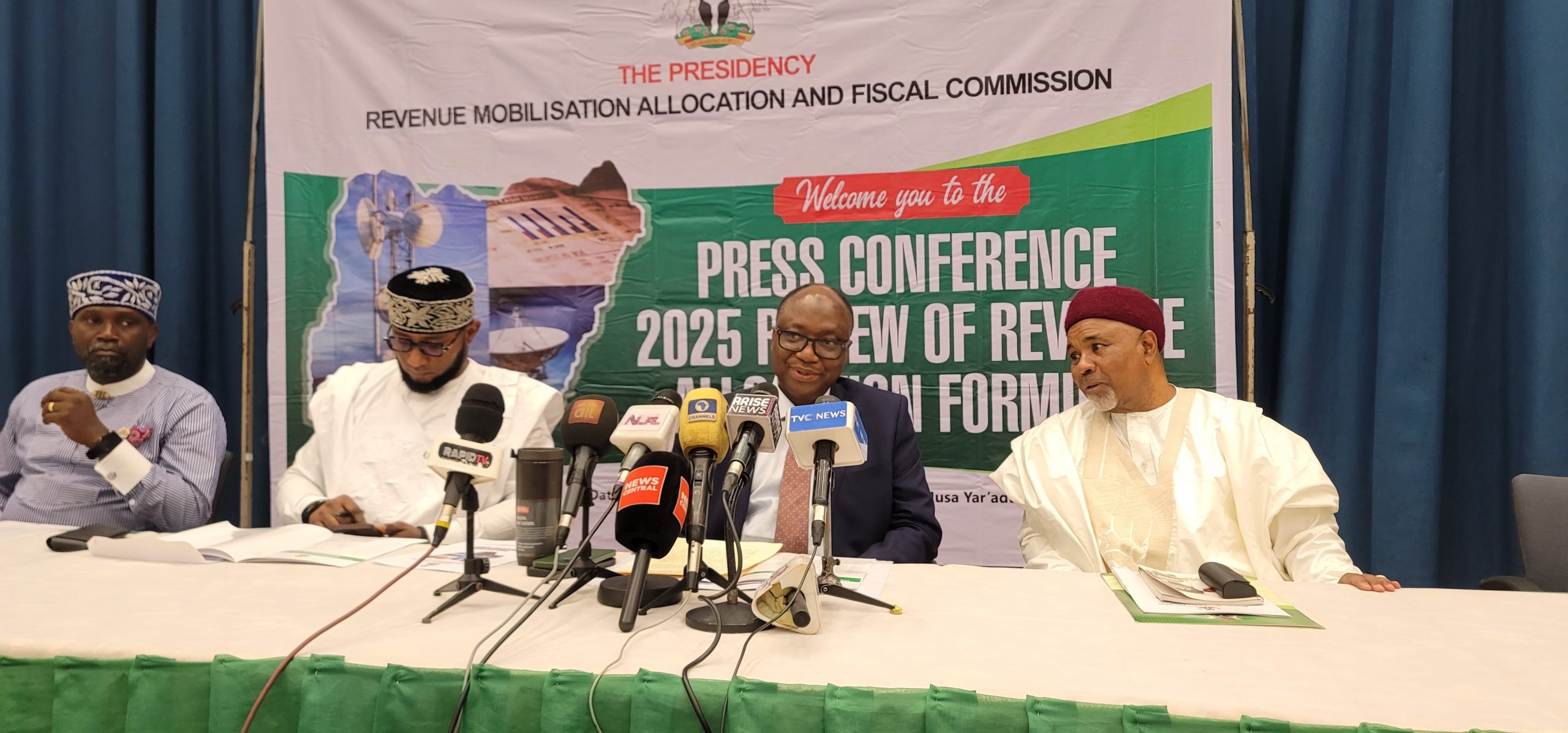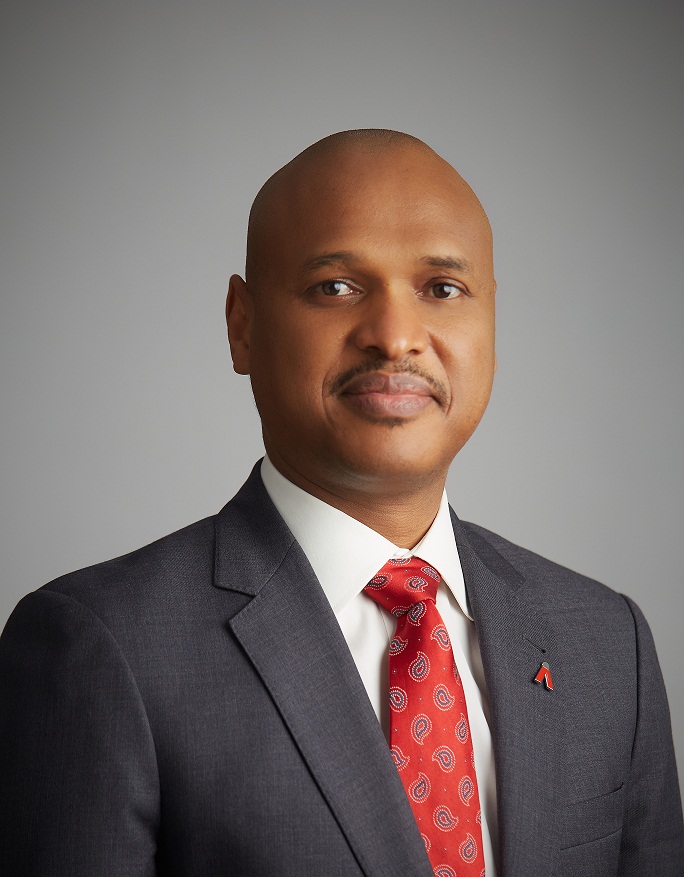Business
33 Years On, RMAFC Begins Review of All-Important Allocation Formula

By Joel Ajayi
After more than three decades, the Revenue Mobilisation Allocation and Fiscal Commission (RMAFC) has officially commenced a comprehensive review of Nigeria’s revenue allocation formula, aiming to align it with the country’s current socio-economic realities.
The last major review of the revenue allocation formula was carried out in 1992. Although there have been several executive adjustments since 2002, a full-scale overhaul had not been undertaken—until now.
Speaking at a press conference on Monday to formally launch the 2025 Revenue Allocation Formula Review, the Chairman of the Commission, Dr. Mohammed Bello Shehu, emphasized that the review is both a constitutional responsibility and a timely necessity.
He stated that the aim of the review is to establish a fair, just, and equitable revenue-sharing formula that reflects the current responsibilities, needs, and capacities of the Federal, State, and Local Governments.
“It is with a profound sense of responsibility and constitutional duty that I welcome you to this important press conference, which marks the formal launch of the review of the current Revenue Allocation Formula (RAF) for sharing revenue among the three tiers of government in Nigeria,” he said.
Dr. Shehu referenced Paragraph 32(b), Part I of the Third Schedule of the 1999 Constitution (as amended), which mandates the RMAFC to “review, from time to time, the revenue allocation formulae and principles in operation to ensure conformity with changing realities.”
He noted that the ongoing review is driven by Nigeria’s evolving economic, political, and constitutional landscape. Notably, recent amendments by the 9th National Assembly transferred several key responsibilities—such as electricity generation and distribution, railways, and correctional services—from the Exclusive to the Concurrent Legislative List.
This devolution of powers, he explained, has placed greater financial and administrative responsibilities on subnational governments, making it necessary to reevaluate the existing fiscal framework.
“The Commission will embark on a thorough, data-driven, and inclusive process,” Dr. Shehu added. “This will involve broad consultations with critical stakeholders, including the Presidency, National Assembly, State Governors, ALGON, the Judiciary, MDAs, civil society organizations, traditional rulers, the organized private sector, and development partners.”
He also noted that RMAFC will integrate cutting-edge research, empirical data, and international best practices into its analysis. The review will assess service delivery obligations, fiscal performance, developmental disparities, and economic capacities at all levels of government.
“Ultimately, our objective is to create a more balanced and sustainable fiscal federalism—one that fosters economic independence at the subnational level while ensuring equity and accountability in revenue distribution.”
Dr. Shehu also appealed for the cooperation of all stakeholders, emphasizing that the review is in the national interest and intended to benefit all Nigerians, not just select segments of the country.
In his remarks, the Federal Commissioner representing Katsina State and Chairman of the Revenue Formula Committee, Kabir Muhammad Mashi, OON, reaffirmed the Commission’s readiness to carry out a successful and impactful review.
Mashi disclosed that while the Commission had produced a report on the Vertical Revenue Allocation Formula in April 2022, it was shelved due to the 2023 constitutional amendments, which significantly altered the responsibilities of the various tiers of government as outlined in the First and Second Schedules of the Constitution.
“Hence, the need for a fresh review of the revenue allocation formula in its entirety—to reflect the current socio-economic challenges in the country, as well as the new economic policies of the current administration,” he said.
He described the event as a pivotal moment in the evolution of Nigeria’s fiscal federalism and intergovernmental fiscal relations.
“It provides an opportunity for us to brief you on our activities so far, to explain our approach, and to receive your valuable input on this vital national matter,” Mashi said. “The Commission is determined to carry out this review through a process that is inclusive, transparent, evidence-based, and fully aligned with the spirit and letters of the 1999 Constitution (as amended).”
Meanwhile, the committee is expected to submit its full report by December 2025.
Business
TAJBank Emerges Nigeria’s Biggest Non-Interest Bank

Cyril Ogar
After five years of operations in Nigeria’s rapidly evolving non-interest banking (NIB) space, TAJBank Limited has become the biggest player in the NIB subsector based on its total assets and gross earnings values.
Disclosing this during his paper presentation on the key performance indices in the non-interest banking space over the past few years at a seminar organized by Leaders Corporate Services with the theme “Roles of Non-Interest Banks In SMEs’ Financing” for SME entrepreneurs yesterday in Abuja, an investment expert, Mr. Olabode Akeredolu-Ale, maintained that based on the non-interest banks’ approved financial statements for the half year 2025, TAJBank currently remained the biggest in terms of its total assets.
The expert, a chartered stockbroker, specifically confirmed that his recent investment researches on the NIBs and their financial performances showed that TAJBank, with its total assets rising to N1.017 trillion in half year 2025 up from N953.098 billion as of December 2024, which is about N53 billion higher than the nearest NIB’s assets, now ranked top in the banking subsector.
According to him, TAJBank’s gross earnings for H1 2025 also surged to N53.752 billion from N32.86 billion as of December 2024, representing a 64% growth, and higher than the nearest NIB’s gross earnings in the period under review.
This is even as he disclosed that on the NIBs’ earnings per share during the half year, TAJBank reported N61.36 kobo earnings per share, about 92% higher than the earnings per share of the next NIB during the period.
Akeredolu-Ale, who is also a chartered accountant, clarified: “The figures I am reeling out here on the NIBs are sourced from the banking and capital market regulatory institutions’ platforms, which anyone can access to verify.
“I am part of this event because of my research interest in non-interest banking and how the players in the subsector in Nigeria can help to leverage their competencies in innovation and ethical banking to support our MSMEs.
“Today, the MSMEs cannot access DMBs’ loans due to high lending rates and other inclement macroeconomic factors. This is where I think the NIBs have become very crucial to Nigeria’s economic growth.
“Overall, my findings on the NIBs indicated that they are all trying their best with non-interest loans to support entrepreneurs, particularly the MSMEs owners. I have advised those of them at this seminar to explore the cost-friendly financing options of the NIBs to grow their businesses by opening accounts with the NIBs”, the expert added.
Another speaker at the event, Benjamin Chukwudi, also commended the NIBs for their “catalytic roles in helping SMEs to access interest-free loans and providing them the needed financial management advisory, which have been helping them in sustaining their operations in the face of rising cost of doing business in the country.”
-

 Featured6 years ago
Featured6 years agoLampard Names New Chelsea Manager
-

 Featured6 years ago
Featured6 years agoFG To Extends Lockdown In FCT, Lagos Ogun states For 7days
-

 Featured6 years ago
Featured6 years agoChildren Custody: Court Adjourns Mike Ezuruonye, Wife’s Case To April 7
-

 Featured6 years ago
Featured6 years agoNYSC Dismisses Report Of DG’s Plan To Islamize Benue Orientation Camp
-

 Featured4 years ago
Featured4 years agoTransfer Saga: How Mikel Obi Refused to compensate me After I Linked Him Worth $4m Deal In Kuwait SC – Okafor
-
Sports3 years ago
TINUBU LAMBAST DELE MOMODU
-

 News10 months ago
News10 months agoZulu to Super Eagles B team, President Tinubu is happy with you
-
Featured6 years ago
Board urges FG to establish one-stop rehabilitation centres in 6 geopolitical zones
